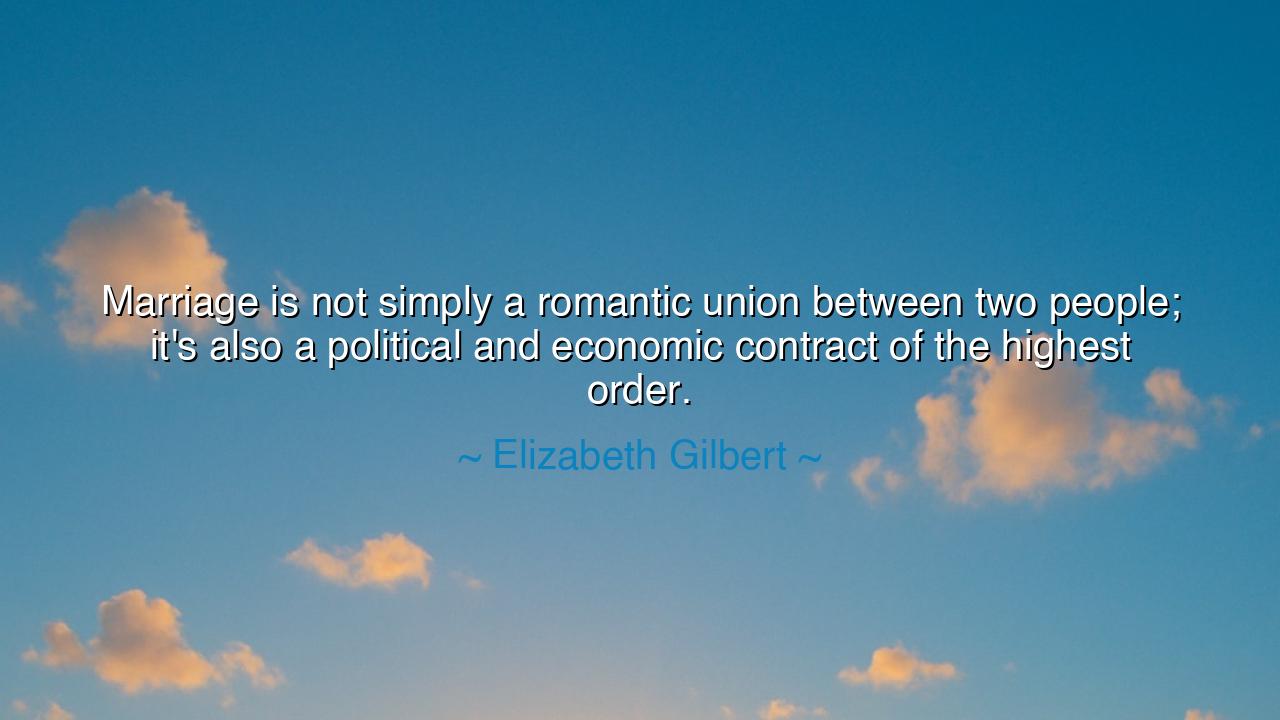
Marriage is not simply a romantic union between two people; it's
Marriage is not simply a romantic union between two people; it's also a political and economic contract of the highest order.






When Elizabeth Gilbert declared, “Marriage is not simply a romantic union between two people; it's also a political and economic contract of the highest order,” she was not diminishing the beauty of love — she was unveiling its hidden architecture. Her words peel back the veil of passion to reveal the deeper structure upon which the institution of marriage has stood for centuries. Love is the fire that draws two souls together, but marriage, in its ancient form, was also a binding covenant — one that shaped nations, secured wealth, and established order. To understand this truth is not to reject romance, but to honor reality: that human unions, though born in the heart, live within the laws of the world.
In the ancient days, before love became the language of marriage, alliances were forged not by affection but by necessity. Kings gave their daughters to rival kingdoms to ensure peace; merchants arranged unions to expand their commerce; peasants married to secure survival. The heart had little say in such matters — marriage was the cornerstone of society’s stability, a contract written not only on parchment but in blood and inheritance. Even in the modern age, echoes of this truth remain: marriages still intertwine families, economies, and futures. Gilbert reminds us that every union, no matter how tender, rests upon a web of responsibility, property, and power.
Consider the story of Marie Antoinette, wed to Louis XVI not out of affection, but as a bridge between France and Austria. Their marriage was not a mere joining of hearts but a political maneuver that shaped the destiny of empires. And yet, even as love faltered under duty, the union’s weight changed the course of history. The lesson here is not cynicism — it is awareness. For when love enters into a world of law, status, and survival, it must learn to dwell among them with wisdom. To love blindly is sweet, but to love wisely is enduring.
Gilbert, a seeker of truth in all its forms, wrote these words after her own confrontation with marriage’s complexities. In her memoir “Committed,” she examined the institution not as a romantic dreamer, but as a historian and philosopher. Having once fled marriage, she came to see it not as a prison, but as a sacred negotiation — a space where love meets the demands of reality. For her, marriage was not the death of freedom, but the acknowledgment of interdependence. To marry, she realized, is to enter into the oldest form of human governance, one that balances heart with law, passion with duty.
The political nature of marriage lies in its impact on community. A marriage alters inheritance, property, social rank, and even citizenship. Governments regulate it, religions sanctify it, and societies judge it. It is an act both private and public, both spiritual and economic. When two people join, their choices ripple outward — shaping families, influencing generations, and stabilizing or disrupting the order around them. Thus, marriage is not a mere celebration of love; it is a pillar of civilization. The wise recognize this and approach it not with naïve expectation, but with reverence and readiness.
And yet, within this awareness, Gilbert’s wisdom carries no bitterness. She does not tell us to abandon romance, but to anchor it in truth. For love that ignores the material and political world is like a bird that refuses to land — beautiful, but unsustainable. The true power of marriage lies in its duality: it is both a spiritual covenant and a worldly contract. When partners understand this balance — when they enter it with open eyes and open hearts — they transform the burden of duty into the art of partnership.
So let the teaching be this: love is divine, but marriage is human, and therefore, it demands both feeling and foresight. To the young, let it be said — do not marry only for passion, for passion burns hot but brief. To the wise, let it be remembered — do not marry only for advantage, for advantage without love breeds emptiness. Seek instead the sacred middle ground, where love and law embrace as equals. For in that union — where heart meets reason, where emotion meets endurance — lies the true strength of marriage: not merely a union of two souls, but the foundation of a life, a family, and a future.






AAdministratorAdministrator
Welcome, honored guests. Please leave a comment, we will respond soon